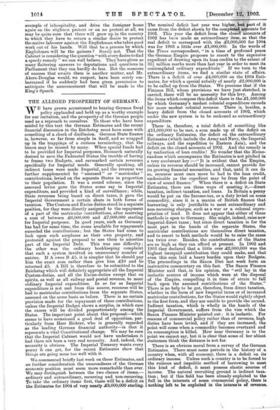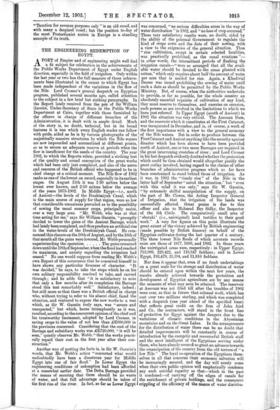THE ALLEGED PROSPERITY OF GERMANY.
WE have grown accustomed to hearing German fiscal policy applauded and held up as a worthy example for our imitation, and the prosperity of the German people used as a reproach to ourselves. To those who have been misled by this text the German Estimates and the recent financial discussion in the Reichstag must have come with something of a shock of disillusion. German State finance is, however, so far from simple in itself, and so wrapped up in the trappings of a curious terminology, that the lesson may be missed by many. When special funds had to be provided for Imperial purposes, Bismarck naturally desired to save the Federated States the trouble of having to frame two Budgets, and earmarked certain revenues specifically for Imperial needs. Generally speaking, all indirect taxes were made Imperial, and the revenue was further supplemented by " assessed " or " matricular " contributions, levied on the separate States in proportion to their population. It was a sound scheme, since the assessed levies gave the States some say in Imperial expenditure, and provided a kind of surveillance ; while, State revenues being based on direct taxes, it gave the Imperial Government a certain share in both forms of taxation. The Custom and Excise duties stood in a separate position, for they were directly assigned to the repayment of a part of the matricular contributions, after reserving a sum of between £6,000,000 and £7,000,000 sterling for Imperial purposes. In good years, such as Germany has had for some time, the sums available for repayments exceeded the contributions ; but the States had come to look upon such surpluses as their own property, and protested against the proposal to use them to amortise part of the Imperial Debt. This was one difficulty ; the other was the ordinary bookkeeping complaint that such a system involved an unnecessary number of entries. If A owes B £5, it is simpler that he should pay him the exact sum rather than give him .210 and be returned £5. A Bill is therefore to be submitted to the Reichstag which will definitely appropriate all the Imperial Custom-duties, and all the Excise-duties except that on spirits, as well as all railway and postal revenue, to meet ordinary Imperial expenditure. In so far as Imperial expenditure is not met from this source, recourse will be had to matricular contributions from the separate States, assessed on the same basis as before. There is no certain provision made for the repayment of these contributions, unless the Imperial Budget shows a surplus, in which case the excess will be divided proportionately among the States. The important point about this proposal—which seems to have occasioned a good deal of opposition, par- ticularly from Herr Richter, who is generally regarded as the leading German financial authority—is that it represents a vital Constitutional change. We may be sure that the Imperial Cabinet would not have undertaken it bad there not been a very real necessity. And, indeed, the necessity is obvious. The Imperial Treasury wants every penny it can get, for the recent Estimates show that things are going none too well with it.
We commented briefly last week on those Estimates, and on further consideration the unsoundness of the German economic position must seem more remarkable than ever. We may distinguish between the two classes of items,— ordinary and extraordinary, recurring and non-recurring. To take the ordinary items first, there will be a deficit on the Estimates for 1904 of very nearly £3,000,000 sterling. IThe nominal deficit last year was higher, but part of it came from the deficit shown by the completed accounts for 1901. This year the deficit from the closed accounts of 1902 has been made an extraordinary item, so that the real deficit to correspond with the £3,000,000 for 1904 was for 1903 a little over £1,000,000. In the words of the Times correspondent, "in• a time of profound peace the German Empire proposes to resort to the expensive expedient of drawing upon its loan credits to the extent of 351 million marks more than last year in order to meet its contemplated ordinary expenditure." If we turn to the extraordinary items, we find a similar state of affairs. There is a deficit of over £4,000,000 on the 1904 Esti- mates, for which a special subsidy of nearly £2,000,000 is to be called up from the States. We presume that if the Finance Bill, whose provisions we have just sketched, is carried, there will be no necessity for this levy. Among the items which compose this deficit there is the £1,500,000 by which Germany's modest colonial expenditure exceeds her more modest colonial revenue. There is, besides, a heavy deficit from the closed accounts of 1902, which under the new system is to be reckoned as extraordinary expenditure.
There is, therefore, a total deficit of something like £11,000,000 to be met, a sum made up of the deficit on the ordinary Estimates, the deficit on the extraordinary Estimates (which include the Army and Navy, the Imperial railways, and the expedition to Eastern Asia), and the deficit on the closed accounts of 1902. And the remedy is by realisation of loan credits ! No wonder that the Memo- randum which accompanies the Estimates is not pitched in a very exuberant key :—" It is evident that the Empire, unless its revenue should be increased, cannot provide for its growing financial necessities, and that, until it can do so, recourse must once more be had to the loan credit, undesirable as the expedient may be from the point of view of sound finance.' When there is a deficit on State Estimates, there are three ways of meeting it,—direct taxation, indirect taxation, and loans. In Britain a penny would be put on the Income-tax, or a duty levied on some commodity, since it is a maxim of British finance that borrowing is only justifiable to meet extraordinary and non-recurring charges, such as a war or a colossal expro- priation of land. It does not appear that either of these methods is open to Germany. She might, indeed, raise new Imperial direct taxes ; but since direct taxation is for the most part in the hands of the separate States, the matricular contributions are themselves direct taxation, and to resort to both methods would be to raise the same tax twice over. Besides, the contributions of the States are as high as they can afford at present. In 1902 and. 1903 they declared that a little over £2,000,000 was the highest unrepaid contribution they could make, and that even this sum laid a heavy burden upon their Budgets. The proceedings in the Saxon Diet last week form an instructive commentary on this fact. The Saxon Finance Minister said that, in his opinion, the "evil lay in the inelastic sources of income which were at the disposal of the Empire, compelling it in time of strain to fall back upon the assessed contributions of the States." There is no help to be got, therefore, from direct taxation, whether in the form of new Imperial taxes or of increased matricular contributions, for the States would rightly object to the first form, and they are unable to provide the second. Indirect taxation, which is wholly in the hands of the Imperial Government, suffers from the vice which the Saxon Finance Minister pointed out : it is inelastic. For reasons of commercial policy rather than of revenue, high duties have been levied, and if they are increased, the point will come when a commodity becomes overtaxed and its consumption is killed. How near Germany is to the point we cannot say, but it is clear that some of her ablest statesmen think the distance is not far.
' There is an obvious moral from a survey of the German Estimates. There must come periods in the history of a country when, with all economy, there is a deficit on its ordinary income. Unless such a country is to be forced to 'the ruinous and impolitic method of borrowing to meet this kind of deficit, it must possess elastic sources of income. The natural recruiting ground is indirect taxa- tion; but if this field has been already exploited to the full in the interests of some commercial policy, there is nothing' left to be exploited in the interests of revenue. "Taxation for revenue purposes only "is an old creed, and with many a despised creed ; but the position to-day of the most Protectionist nation in Europe is a standing example of its truth.



























































 Previous page
Previous page